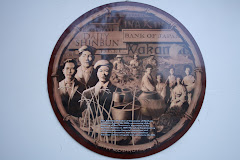In an Oct. 27 letter to readers, Hokubei Mainichi President and CEO Don Yamate explained that the newspaper would halt publication "as a result of our worsening financial situation." He also apologized for the last minute notice, writing that the staff at the Hokubei "sincerely regret having to give the bad news so suddenly."
Hokubei Mainichi ran its last issue October 30, and its final publication comes only 50 days after its former competitor, the Nichi Bei Times, closed (an offshoot of the Times, the nonprofit Nichi Bei Foundation, now prints a weekly English edition and thrice-weekly Japanese issue). The loss of both publications made the news that much harder for Japantown residents and leaves some scrambling for a new source of news.
"It's very inconvenient," Keiko Sajan said as she sat with three friends drinking tea and coffee in the Japan Center. "I used to read it every day." Sajan, the only one of the group of four who spoke English, said she will now get her news from television.
"Tragic," executive director of the Japantown Task Force Robert Hamaguchi said as he held up the Hokubei final edition. "It's just unfortunate they couldn't have come together with the Nichi Bei Times."
Hokubei CEO Don Yamate did offer a glimmer of hope, saying "the company will continue to seek investors and make every effort to once again become a media outlet serving the community," but the prospects appear dim.
Staff members are still gathering and posting Japanese-American related news on the Hokubei Web site, although they are not being paid and are "preparing to go dark" Hokubei columnist Delia Tomino Nakamaya said. In her opinion, the internet version would last until the beginning of 2010 at the latest due to the difficulty in raising funds.
Nakamaya tried to rally readers in her final article and appealed for assistance in the form of financial support or advertising in the hope that the Hokubei may print again.
"A newspaper is the voice of a community," she wrote. "When developers aspire to land-grab or a school in Japantown is in need of support or funding, Hokubei Mainichi has been there to let us all know what is going on and what actions we can manifest. Without a newspaper, a community is silenced. As Japanese Americans, we know very the well the terror of silence, the resounding silence of America as we were interned duing World War II when no one spoke out against our four-year imprisonment."
"A newspaper is the voice of a community," she wrote. "When developers aspire to land-grab or a school in Japantown is in need of support or funding, Hokubei Mainichi has been there to let us all know what is going on and what actions we can manifest. Without a newspaper, a community is silenced. As Japanese Americans, we know very the well the terror of silence, the resounding silence of America as we were interned duing World War II when no one spoke out against our four-year imprisonment."
Nakamaya is now exploring other options as the Hokubei has struggled to raise the $500 needed to keep the online version going without employees being paid.
From 1977 to 2007, Hokubei Mainichi was housed in the large building on the corner of Post and Webster streets, but with diminishing revenue the newspaper company sold the building to Viz Media in 2007 and moved to 1710 Octavia St. The Post Street building is now occupied by New People, which houses a Japanese themed art gallery, movie theater, and small boutiques.
For now, all that remain of Hokubei Mainichi is dwindling online news and a small plaque in the front window of New People, the end of which reads:
"Founded in 1948, the bilingual newspaper voiced the post-World War II concerns of both older Japanese immigrants and Japanese Americans, chronicling news and issues critical to the community that were not covered by the mainstream press. Both as social center and home to the Hokubei Mainichi, 1746 Post Street served to unite the community."




No comments:
Post a Comment